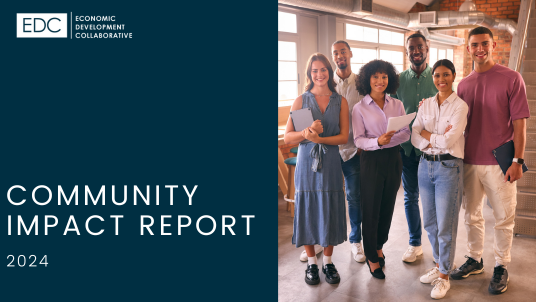Publications
The Economic Development Collaborative regularly collaborates with regional and national partners to sponsor research that provides industry data to support economic development. EDC also conducts studies on key sector industries to identify changing industrial trends and opportunities for economic growth, promote our region’s economic assets and identify barriers to economic prosperity.
Summary Presentation- Innovation by Small Businesses During COVID-19
EDC Small Business Development Center (SBDC) Director, Dr. Ray Bowman, has co-authored a groundbreaking study titled "Who innovates during a crisis? Evidence from small businesses during COVID-19." The study, published in the Journal of Evolutionary Economics, provides unique empirical evidence of how small businesses innovated during the initial uncertainty and rapid changes of the COVID-19 pandemic. This summary presentation outlines the study results and implications.
August 9, 2023
Transportation Broadband Strategies to Reduce Vehicle Miles Traveled and Greenhouse Gas Study
Pursuing long-term solutions to address climate change, the Southern California Association of Governments (SCAG), California Emerging Technology Fund (CETF) in partnership with the Broadband Consortium Pacific Coast (BCPC) announced recommendations to reduce vehicle-generated greenhouse gas (GHG) emissions by accelerating broadband infrastructure construction and home broadband adoption to decrease vehicle trips.
April 28, 2022
The 2020 Report on the Ventura and Santa Barbara Creative Economies
The Report on the Ventura and Santa Barbara Counties Creative Economies makes an important and unique contribution to a more complete regional economic outlook by examining the economic impact of creativity in the Ventura and Santa Barbara Counties region prior to COVID-19.
May 4, 2022
Profile of COVID-19, Community, Business, Nonprofit & Worker Impacts
This study looks into the profile of our regional communities, businesses and nonprofits with an emphasis on the social and economic impacts of COVID-19 on our vulnerable communities, small businesses and nonprofits in Ventura and Santa Barbara Counties in search of an equitable and inclusive recovery plan.
November 17, 2021
COVID-19 Impact on California’s Entrepreneurs
The California SBDCs conducted an extensive survey of its contacts in the California SBDC database that asked 22,102 respondents about their business activities between January 2020 and July 2020, with the goal of understanding the specific needs of California's small businesses during the COVID-19 crisis.
Careers in Global Trade and Logistics 2020
This report, commissioned by the California Community Colleges through its employer engagement initiatives and compiled by the EDC and Xopolis LLC, aims to provide a more fine-grained analysis of the international trade and logistics job market and the skills driving employment in this sector.
Careers in Global Trade Exploration Database
This interactive dashboard is the first of its kind and represents a novel policy tool for quick comparison of the global trade and logistics workforce at a detailed level of disaggregation. The information contained in this report is a subset of all the data available through the online dashboard.
February 26, 2020
Ojai Valley Identity Dossier
In early 2019, the Economic Development Collaborative, in conjunction with the Ojai Valley Chamber of Commerce, and the Agora Foundation, embarked on a scope of work with Civilis Consultants to assist the EDC as they build a program to foster business resiliency in communities that may be subject to natural disasters. The culmination of the project is this Civic Dossier, which lays out findings and toolkits for the top three stakeholders in commercial districts: property owners, business owners and the public sector/agencies in the Ojai Valley.
Best Practices: Workforce Systems
In an effort to support and enhance the workforce systems in Ventura County and throughout the State, the EDC, in partnership with the California Stewardship Network and by the support of the Morgan Family Foundation, has compiled this Report, outlining seven case studies and federal guidance on the integration of the registered apprenticeship model into the local Workforce System, with an emphasis on best practices for braiding funds and functions among WIOA partners to scale the apprenticeship model.
Manufacturing Traders Along California’s Central Coast 2019
Engaging in international trade requires a business to identify new markets, meet new standards, participate in different regulatory frameworks and connect to relevant professional networks. In this respect, businesses need to innovate to extend their reach to international markets. It is with this intuition that we explored the question, are manufacturers who trade internationally qualitatively different from non-trade manufacturers? To answer this question, we examined the age, employment and sales patterns of manufacturing establishments engaging in international trade along the south-central coast of California and compared them to non-trade manufacturing establishments in the region.
Business Migration Report 2019
For many in California, the business climate defined by escalating costs and challenges owing to high taxation and regulation is driving a mass exodus of business from the state. Given the recent lack of growth in our local economy, it’s an easy story to believe. But what if the data doesn’t support the story of businesses migrating out of the state? What if it turns out that our local economy in fact benefits from more businesses moving in than moving out? The Business Migration Report 2019 shows that’s exactly what we found for our central coast region.
Business Migration Data 2019
The Business Migration Data 2019 provides additional figures and tables from the Business Migration Report 2019.
Ventura County’s Entrepreneurial Ecosystem
The Ventura County Entrepreneurial Ecosystem report outlines real entrepreneurial activity of the region, along every dimension, about real outcomes of entrepreneurship for the region and about real options for making a strong ecosystem stronger. It is the outcome of an intensive six-month research effort undertaken by Xopolis LLC that comprises both extensive interviews with key players in the Ventura County entrepreneurial ecosystem and the use of novel data analytic techniques.
The Global Food and Agricultural Economy - Ventura & Santa Barbara County
This report from the Oxnard World Trade Center, developed in partnership with California Lutheran University School of Management and the Economic Development Collaborative, focuses on the international trade activity of agribusiness in Ventura and Santa Barbara counties. The analysis concentrates on the trade activity of the top 40 firms that contribute over 90% of the region’s international trade in food and agriculture.
Introducing a Water Market in Ventura County
As Ventura County struggles to cope with the long-term shortage of water, water trading has promise as a viable way to redistribute water under a free-market system that will provide an economic return on conservation, incentives to create new water supplies and flexibility as regulators reduce extraction to sustainable levels. A water market is a way to transfer the allocation of groundwater pumping between water users. It is an administrative process that enables people who have excess water allocation to sell it to people who need it. Both sellers and buyers participate in the water exchange voluntarily. With involvement of agricultural, municipal and environmental stakeholders, Ventura County is developing the first water market of its kind, created as a response to new groundwater regulation, the Sustainable Groundwater Management Act (2014).
Food Processing in Ventura County
Agriculture has long been a characteristic component of the Ventura County economy. However, as with many economic sectors, agriculture must evolve to meet constantly changing market challenges. The Food Processing in Ventura County Report addresses the need and opportunity to increase the level of value added processing in the county to better support the farming community and a comprehensive food systems strategy.
Ventura County Economic Vitality Plan
The Economic Vitality Strategic Plan (EVSP) champions our local economy and works to create targeted, sustainable economic growth that will support and improve the quality of life for Ventura County residents while remaining responsive to the evolving needs and opportunities of the local economy. The EVSP focuses on aligning and coordinating efforts between the County of Ventura, incorporated cities and economic development entities.
ANNUAL REPORTS
Each year the EDC strives to meet their yearly goals while honoring their core values, mission and vision. In doing so, the EDC highlights their impact by featuring their various programs and achievements. In each Community Impact report you observe how the EDC has increased their level of capacity, spirit and endurance year after year.
EDC Community Impact Report 2025
EDC Community Impact Report 2025: Lights Off, Work On: the Reel Engine of Film
January 15, 2026
EDC Informe de Impacto Comunitario 2024
EDC Informe de Impacto Comunitario 2024
EDC Informe de Impacto Comunitario 2023
EDC Informe de Impacto Comunitario 2023: Conectando Comunidades
EDC Community Impact Report 2023
EDC Community Impact Report 2023: Connecting Communities
EDC Informe de Impacto Comunitario 2022
EDC Informe de Impacto Comunitario 2022: Creando Prosperidad Con Intención
EDC Community Impact Report 2022
EDC Community Impact Report 2022: Purposefully Creating Prosperity
EDC Community Impact Report 2021
EDC Community Impact Report 2021: Celebrating 25 Years of Collaboration
EDC Community Impact 2020
EDC Community Impact Report 2020: The Act of Becoming, A New Era of Opportunity
EDC Community Impact 2019
EDC Community Impact Report 2019: Facing the Future, Growing Impact, Reach, Partnerships and Prosperity
EDC Community Impact 2018
EDC Community Impact Report 2018: Building Business Resiliency, Doubling Service Capacity
EDC Community Impact 2017
EDC Community Impact Report 2017: Energizing the Economy Through Entrepreneurship


































